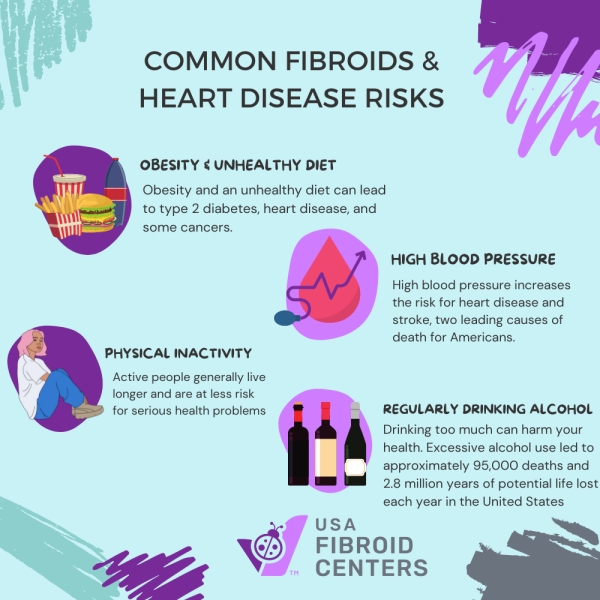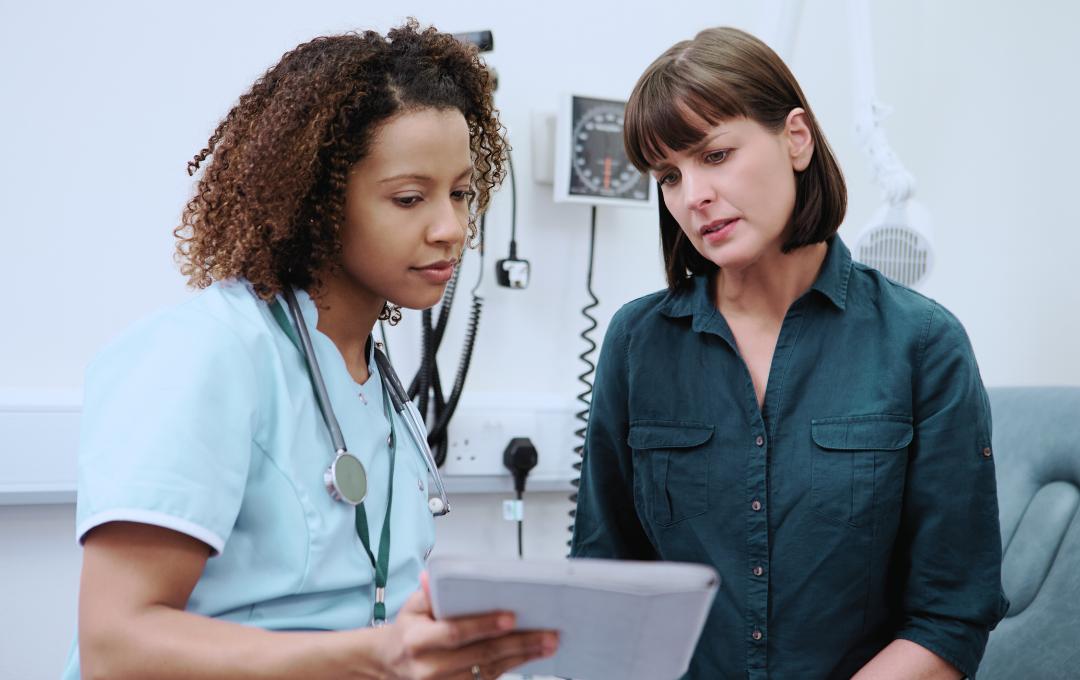
Do fibroids affect your heart? Heart disease is the leading cause of death for women in the United States and studies have shown that women with fibroids are more likely to have increased cardiovascular disease risk factors such as high blood pressure. This February, during Heart Awareness Month, it’s time for women to understand their increased risk of developing cardiovascular disease
Fibroids and Heart Problems
If you are one of the 26 million women living with fibroids, you may be at increased risk for heart problems later in life.
While fibroids themselves are not a direct cause of heart disease, they’ve been linked to a higher risk of developing high blood pressure, a major risk factor for heart disease.
If you aren’t sure if you have fibroids, our symptom checker can help you determine if you should consult your doctor for an official diagnosis.
The Link Between Fibroids and Heart Disease
Since fibroids and heart disease share several common risk factors, the Journal of Women’s Health has found that fibroids can be used as a marker for potentially developing cardiovascular issues.
For example, women with fibroids appear to have lower levels of HDL (good cholesterol), which can protect the heart against heart attack and stroke. According to the American Heart Association, clogged arteries and low HDL cholesterol are risk factors for heart disease.
Here are some of the other overlapping risk factors of fibroids and heart disease:
- Having a family history of heart disease or fibroids
- Obesity
- High blood pressure
- Unhealthy diet
- Physical inactivity
- Regularly drinking alcohol
Monitoring risk factors and recognizing symptoms early are important to ensure timely diagnosis of heart disease or fibroids. A fibroid diagnosis emphasizes the importance of paying close attention to your heart health.
Consult with your doctor to discuss any concerns and explore treatment options, such as uterine fibroid embolization (UFE) to ensure timely treatment and managing your symptoms.
Can Fibroids Cause High Blood Pressure?
The National Institute of Health indicates that women with fibroids are more likely to have high blood pressure than women without fibroids. Although further research is required to understand the connection between hypertension, blood pressure and fibroids.
Possible explanations for this relationship include:
- Increased uterine blood flow: Fibroid growth depends on receiving a good blood supply. This demand for blood strains your cardiovascular system, potentially raising blood pressure.
- Hormonal imbalances: Fibroids develop during a woman’s reproductive years, a time marked by substantial changes in estrogen and progesterone levels, disrupting blood pressure regulation.
- Inflammation: Chronic inflammation associated with fibroids can contribute to cardiovascular issues.
If you have fibroids and are concerned about your blood pressure, talk to your doctor so they can monitor your blood pressure and recommend any necessary treatment.
Heart Health with Fibroids
If you’ve been diagnosed with fibroids, there are a few ways to proactively manage the increased risk of heart disease:
- Regularly monitor your blood pressure: Get your blood pressure checked at the doctor’s office, or you can purchase a blood pressure monitor to test at home as well.
- Maintain a healthy lifestyle: Eat a heart-healthy diet, exercise regularly, and manage your stress levels.
Communication with your doctor is key. Make sure to discuss your fibroid symptoms and any heart health concerns so they can help you stay on top of necessary screenings and provide guidance on managing both your fibroids and cardiovascular health effectively.
Fibroid symptoms vary for individuals, but the most common symptoms are:
- Heavy bleeding or prolonged menstrual periods
- Pelvic pain, cramping, and pressure
- Frequent urination
- Difficulty getting pregnant
- Abdominal bloating or enlargement
Fibroid Treatment and Heart Health
Understanding how different fibroid treatments affect heart health can help you make the best choice for managing fibroid symptoms.
Hysterectomy and Heart Disease
A hysterectomy, especially one that removes the ovaries in addition to the uterus, can increase a woman’s risk of heart disease. This is largely due to the drop in estrogen levels, which plays a protective role for the heart. Lower estrogen can lead to several heart disease risk factors, including high blood pressure, negative changes in cholesterol levels, weight gain, and insulin resistance.
Additionally, a hysterectomy can also contribute to increased inflammation and metabolic changes, all of which can negatively affect cardiovascular health. Women who have a hysterectomy, particularly at a younger age, should take proactive steps to protect their heart health. This includes regular screenings, a healthy diet, exercise, and working closely with their doctor to manage any potential risks.
Uterine Fibroid Embolization and Heart Disease
Uterine fibroid embolization (UFE) does not directly increase the risk of heart disease like a hysterectomy can. Since UFE preserves the uterus and ovaries, it allows the body to maintain natural hormone levels, particularly estrogen, which plays a protective role in heart health.
In fact, some studies suggest that UFE may have a neutral or even positive impact on cardiovascular health. By reducing fibroid-related symptoms like heavy bleeding and anemia, UFE can help improve overall well-being, energy levels, and circulation. Severe anemia, often caused by fibroids, can strain the heart over time, so treating the condition may indirectly support heart health.
Questions About UFE? Call 888.615.2555
Prioritize Your Health with USA Fibroid Centers
While fibroids and the potential link to heart health may seem daunting, remember that you are not alone. You can live a full and healthy life by prioritizing your well-being, managing your fibroids effectively, and staying informed about your heart health.
Understanding the connection between fibroids and heart health allows you to take charge of your well-being and build a brighter, healthier future. Part of living healthier is getting screened for fibroid and heart disease risks.
USA Fibroid Centers has locations all over the United States with well-trained and professional radiologists to help evaluate how fibroid disease may impact your health.
Our radiologists are the best in the country and always put you and your health concerns first. By scheduling a consultation online or giving us a call at 855-615-2555, we can help you better proactively manage your health.
FAQs About Fibroids Impact on Heart Health
For anyone wanting to learn more about fibroids, cardiovascular risks, and their relationship with each other, here are the answers to common questions about these conditions.
Can Fibroids Cause Heart Disease?
Fibroids themselves do not directly cause heart disease, but they can contribute to high blood pressure, particularly when they cause symptoms like heavy bleeding or anemia. However, certain treatments for fibroids, like hysterectomies, may increase the risk of heart disease due to hormonal changes that affect cardiovascular health.
Can Fibroids Cause Heart Palpitations?
Although fibroids share risk factors with heart disease, they do not directly cause problems such as heart palpitations. Since fibroids are located in the uterus, fibroids are more likely to impact menstruation and pregnancy.
Heart palpitations are also not a sign of heart disease, as they can be caused by exercise or increased caffeine intake. However, if you are concerned about heart palpitations and their relationship to your fibroid diagnosis, consult a fibroid specialist.
Do Fibroids Cause High Blood Pressure?
Yes, fibroids can contribute to high blood pressure in some cases. This is often due to the strain they place on the body, particularly when they cause heavy bleeding, anemia, or pressure on surrounding organs. Severe anemia caused by fibroids can lead to an increased heart rate and put more stress on the cardiovascular system, which may contribute to higher blood pressure.
Schedule a Fibroid Consultation







